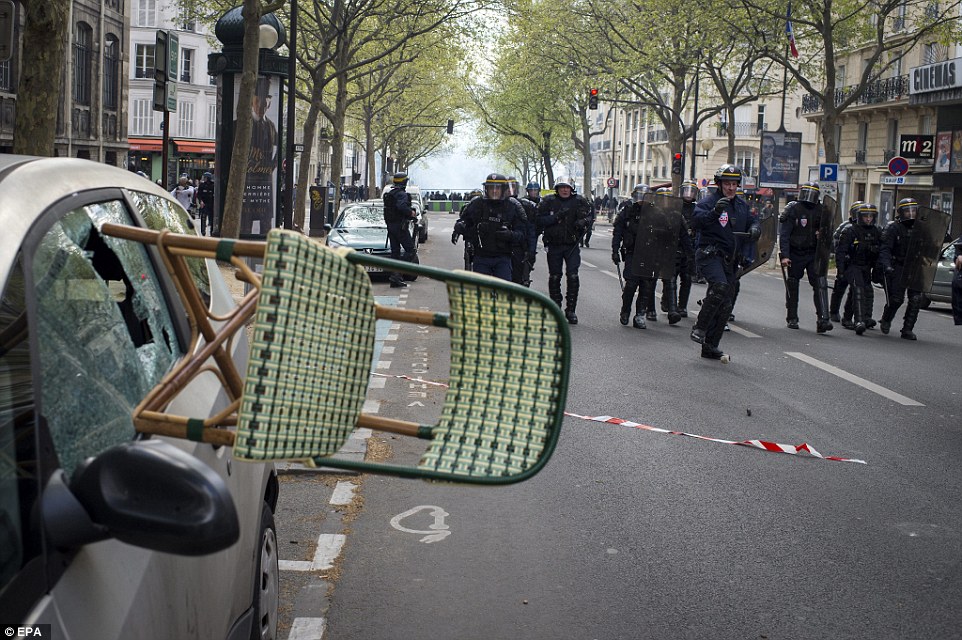All over France strikes and demonstrations are taking place. People are protesting against the French government’s attempt to reform labour laws which would make it easier to hire and fire workers. French labour laws have always been seen as an obstacle to progress by the ruling class due to the modest protection they afford workers.
Since the popular front of 1936 and in particular the National Council of the Resistance formed after the liberation in 1945, French worker made significant gains. These ‘acquis sociaux’ or social gains are now being brutally rolled back by a powerful oligarchy bent on driving down the price of labour and increasing the profits of capitalists.
One of the reasons why French society made such dramatic economic and social progress after the Second World War was due to the strong presence of the French Communist Party (PCF). The PCF played a key role in resisting and overthrowing the Nazi occupation. By the end of the war they were the largest and most powerful party in France. Communists had a significant influence over the policies of the National Council of the Resistance and it was their alliance with the Gaullists that created a strong, industrial state-directed economy; free education, universal health care and modest improvements in the standard of living. However, French communists had never developed a revolutionary strategy capable of seizing power and imposing a dictatorship of the proletariat.
The Communist International had never approved of the nomination of Maurice Thorez as General Secretary of the Communist Party in 1930, as they had correctly judged that he had not grasped the Marxist conception of the state. The deaths of great French communists Henri Barbusse and Fernand Grenier before and during the war also dealt a blow to the prospects of effective revolutionary leadership. Thorez’s speeches and writing reveal that he was closer to Rousseau than Marx; the French communist was more of a petty-bourgeois humanist than a revolutionary Leninist. President De Gaulle is said to have remarked that there would be no communist revolution in France while Thorez was head of the PCF – he was right.
Already in 1947, Thorez told Time magazine that the French communists were seeking a ”third way” to socialism – a form of class collaboration that would miraculously lead to the elimination of class; this opportunistic nonsense pervaded all of the European countries (with the exception of Albania) claiming to be constructing socialism; they preferred to use the term ‘popular democracy’ instead of the dictatorship of the proletariat. In the German Democratic Republic, for example, Moscow’s wise advice not to attempt socialist construction until the country was reunified was ignored by Walter Ulbricht, leader of the Socialist Unity Party.
The Soviets had understood that an attempt to build socialism in the highly agrarian and underdeveloped East Germany, would play into the hands of the U.S. occupied West; the U.S. would entice East German peasants to flee to the more industrialised West, whose industries had deliberately been spared by the allied bombing. As a result, Eric Honecker admitted as late as 1972 that the country was still not socialist. The East Germans had embarked on a ‘third way’, creating a petty-bourgeois social democracy where Christian democrat and liberal parties sat alongside the Socialist Unity Party in the Volkskamer (parliament).
During the strikes in Marseilles and throughout France in 1947, the country was brought to a standstill. French workers were striking due to the harsh austerity conditions imposed by the De Gaulle government during the reconstruction of France. Due to the petty-bourgeois ‘third way’ attitude of the PCF’s leadership, there was no revolutionary strategy to seize power and expropriate the expropriators. Gaston Defferre, the socialist mayor of Marseille, collaborated with the CIA to break the strike by importing foreign workers and re-empowering the local drug-smuggling mafia against the communist organised unions. A major opportunity had been lost.
In 1968, France erupted again in major strikes and demonstrations against poor working conditions and salaries. There are two key aspects to consider in understanding the 1968 Paris uprisings. One involves U.S. geopolitics and the other class struggle. The U.S clearly wanted to oust De Gaulle and bring France closer to NATO and neo-liberal economics. On the other hand, working class militancy was threatening to overthrow the bourgeois order. Mass strikes did achieve significant gains for the French working class, who succeeded in gaining an increase in the minimum wage.
These gains were soon offset , however, by post-1968 inflation. Furthermore, the leaders of the student protests, in particular, Daniel Cohn-Bendit were on the payroll of the CIA. Cohn-Bendit went on to an illustrious career in the E.U. Sabotaging a popular revolt on behalf of imperialism is not the only crime of which the French politician has been accused. There have been numerous accusations of child-rape.
The 1968 uprising was the beginning of the end for the prospect of revolutionary change in France. Most of the ‘leftist’ leaders would become vociferous advocates of U.S. Imperialism and Zionism in later life – Bernard-Henri Lévy, André Glucksman, Alain Krivine, Bernard Kouchner, Daniel Bensaïd, Henri Weber, Pierre Lambert. Tiennoch Grumbach, Marc Kravetz and many more all become the most fanatical advocates of capitalism and U.S. Imperialism.
With De Gaulle out of the way, the arms embargo against Israel imposed in 1967 was promptly lifted by President Pompidou and in 1973 the Rothschild Law was passed depriving the French state of the right to print money. The result has been a lowing of living standards and an explosion of the national debt, with 1400 billion euros on interest alone paid, for the most part, to foreign private bankers.
The hybridity of the 1968 revolt holds lessons for today. As French workers take concrete actions, occupying oil refineries, nuclear power stations and bringing public transport to a halt, the Hollande regime is faced with the prospect of an uncontrollable popular uprising. It is hardly surprising therefore that the oligarchs responsible for the utterly reactionary and counter-revolutionary Arab Spring would promote ‘nuit debout’. The ruling elite have understood for a long time how to manipulate the petty bourgeoisie – who Lenin described as a vacillating class; they are being used throughout the world by finance capitalism as a battering ram against what remains of the social state.
The leftist intellectuals of ‘Nuit debout’ are attempting to gain control of the workers movement. This needs to be resisted with an iron fist! No more specious sloganeering about ‘social republics’ and ‘another world is possible!’
It is time for French workers to bring all enterprises public and private under their control.
The labour movement needs to understand the connection between the fraudulent war on terror, the endless foreign wars and their own class oppression. Terrorist attacks requiring more militarisation and suspension of civil liberties will be used by the state to crush working class solidarity, inciting racism and xenophobia. Coercive engineered migration, whereby oligarchs such as George Soros are financing the replacement of European workers by ‘migrants,’ will be also be used to crush working class unity.
Therefore, the first stage in social emancipation will require the affirmation of national sovereignty – an end to the ultra-leftist and infantile slogan of ‘no borders’ which has always meant ‘capitalism without borders’. If this movement is led by workers, then the national revolution can become a socialist one, spreading throughout Europe and the world.
***
Gearóid Ó Colmáin is an Irish journalist and political analyst based in Paris. His work focuses on globalisation, geopolitics and class struggle.
READ MORE ON FRANCE: 21st Century Wire French Files















